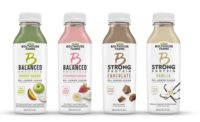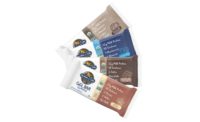Boosting Beverages with Nutritional Ingredients
Beverage makers appeal to consumers with products that contain vitamins and minerals, protein (plant or dairy), botanicals, tea, tea extracts, probiotics, prebiotics, and fiber

Botanical extracts have been experiencing tremendous attention, with techniology allowing even oil-derived types to mix easily into liquids.
PHOTO COURTESY OF: Kerry Group plc

Exotic tropical superfruits, such as guava and passionfruit, are enjoying a big revival in beverages, adding intense flavor and health benefits.
PHOTO COURTESY OF: iTi Tropicals, Inc.

Green tea, green tea extracts, and tea phytochemicals is a modern continuation of one of the most ancient healthy beverage traditions.
PHOTO COURTESY OF: Taiyo America, Inc./iStock/KMNPhoto

The right organic, high-intensity sweeteners can be a pivotal ingredient for many healthful beverage formulations.
PHOTO COURTESY OF: Batory Foods, Inc.

One big trend in beverages has been adding nutraceuticals like superfruit flavors, antioxidants, and vitamins to alcohol beverages.
PHOTO COURTESY OF: Talking Rain Beverage Co.





Today’s consumers are rarely satisfied with just a thirst-quenching drink when they crave a beverage. They’re seeking healthful extras that target everything from immunity to mood issues, from energy to meal replacement. And of course, they want plenty of flavor with few calories.
The beverages that most appeal to these consumers boldly boast boosts that include vitamins and minerals, protein (plant or dairy), botanicals, tea, tea extracts, probiotics, prebiotics, and fiber.
Botanically enhanced drinks are among the leaders of the six-pack in sales. They are touting ingredients that modulate or stimulate immunity, or possess anti-inflammatory benefits. Ingredients in this category are too numerous to list, but the most popular ones of late are extracts or decoctions of ginger, echinacea, cayenne, cinnamon, eucalyptus, green tea, mint, and rosemary.
Floral botanicals, too, are in wide use, especially hibiscus, elderflower, rose, chamomile, jasmine, passionflower, and lavender. Hibiscus (a.k.a. jamaica) has been making a particularly strong comeback, having first experienced popularity in the 1970s and 1980s. Other trending botanicals are turmeric and ashwagandha (Withania somnifera). These are emerging across all flavor profiles, in both functional beverages and relaxation and hydration drinks.
Some of these botanicals, especially the florals, provide favorable flavor attributes and require minimal processing—often being employed as a concentrate from steeping and draining. But they are enjoyed for their calming and other effects as well. Those without the flavor advantages are often incorporated into more complex formulations that have a strong flavor profile or into a medium that masks any bitter or off notes.
Leaf and Spore
While botanicals have been experiencing an upsurge in use in better-for-you (BFY) products, they can present a challenge in terms of flavor, as many are astringent or bitter. Hops (Humulus lupulus) have been moving beyond beers and ales and into other beverage formats. Echinacea is moving from supplements into beverages due to its purported immunity-supporting activity, and turmeric is gaining popularity for its anti-inflammatory properties. These ingredients typically require a strongly flavored medium and maskers or balancers in the formulation.
Turmeric has won over some consumers by being incorporated into a dairy (or dairy analog) base as “golden milk.” The dairy base neutralizes the sharper flavor notes of this powerful ingredient, and it is often balanced with other spices, including turmeric’s botanical cousin, ginger. Somewhat new to the scene is umckaloabo, also known as the South African geranium (Pelargonium sidoides). It is an herb with a long history of warding off the common cold and treating symptoms of respiratory illnesses.
Available in both extract and powder forms, mushrooms play very well with the bold, earthy flavors of coffee, tea, and cocoa-based beverages, while enhancing the ability of these products to improve immunity, decrease stress, and increase resilience.
Mushrooms have long been touted as nutritional support ingredients because of their high levels of beta-glucan, as well as certain chemical compounds recognized as medicinal. Many clinical studies show that beta-glucans have strong immunomodulating effects. Mushrooms like lion’s mane (Hericium erinaceus), shiitake, and reishi (Ganoderma lingzhi) boost immune support and act as adaptogens.
Beauty-from-within beverages often include vitamin C and antioxidant carotenoids, such as astaxanthin. But relatively new to the category is extracts from the tremella mushroom (Tremella fuciformis). These extracts are believed to help skin retain moisture and to enhance collagen fibers that keep skin healthy and bouncy, making the mushroom a plant-based alternative to animal collagen.
Mind and mood
Once considered a niche category, energy drinks are now one of the fastest-growing beverage segments. However, while demand grows, consumers’ aversion to jitters or the “crash” experienced with the energy drinks of old also increases. This conundrum leaves developers with the challenge of fulfilling consumers’ desire for a product that makes them alert yet calm.
Natural sources of this magical balance include maca (Lepidium meyenii), rhodiola (Rhodiola rosea), and ginseng. Natural caffeine sources and similar stimulants include guarana, yerba maté, guayusa, and matcha. Matcha also contains high amounts of L-theanine, which extends the effects of caffeine while also contributing calming properties to produce that desired alert-yet-calm state.
Available in powder and liquid forms, these natural alkaloid products should be used with care. They can carry bitter or sour notes that require a counterbalancing ingredient to achieve a pleasing flavor.
Today’s superfruits
High-antioxidant fruits have become a staple of healthful beverages with flavor. Pomegranate, açai, and dragonfruit, once rare and exotic, have become relatively commonplace. Today’s popular fruit and vegetable juices and concentrates embrace a greater range, from the more mainstream, such as blueberry and apricot (finally getting their share of recognition as nutrient-dense ingredients), to the more exotic, such as camu-camu, aronia berries, acerola, elderberry, lemongrass, and yuzu. All add a powerful punch of flavor and are rich in compounds like vitamins, phytochemicals, and those much-favored antioxidants, especially anthocyanins.
Used in conjunction with botanical extracts, concentrates of such favored fruits mix easily with water and blend seamlessly with liquid proteins and protein powders. Concentrates are a preferred form in beverage development as they provide consistency independent of source and season. Moreover, they allow the formulator to dilute the product as needed to reach flavor and nutritional goals.
Tart cherries have enjoyed popularity among the sleep-deprived for years because of their natural supply of melatonin, a hormone that regulates the sleep cycle. Melatonin on its own is sold as a dietary supplement requiring FDA regulation, but not so for tart cherries. This makes tart cherries ideal for developers seeking a natural sleep aid for a beverage (although labeling standards could limit how a cherry product can be marketed as a sleep aid). In addition, developers can combine tart cherry concentrate with ingredients such as ashwagandha, chamomile, and ginseng to create palate-pleasing nighttime beverages.
Looking for a reprint of this article?
From high-res PDFs to custom plaques, order your copy today!





